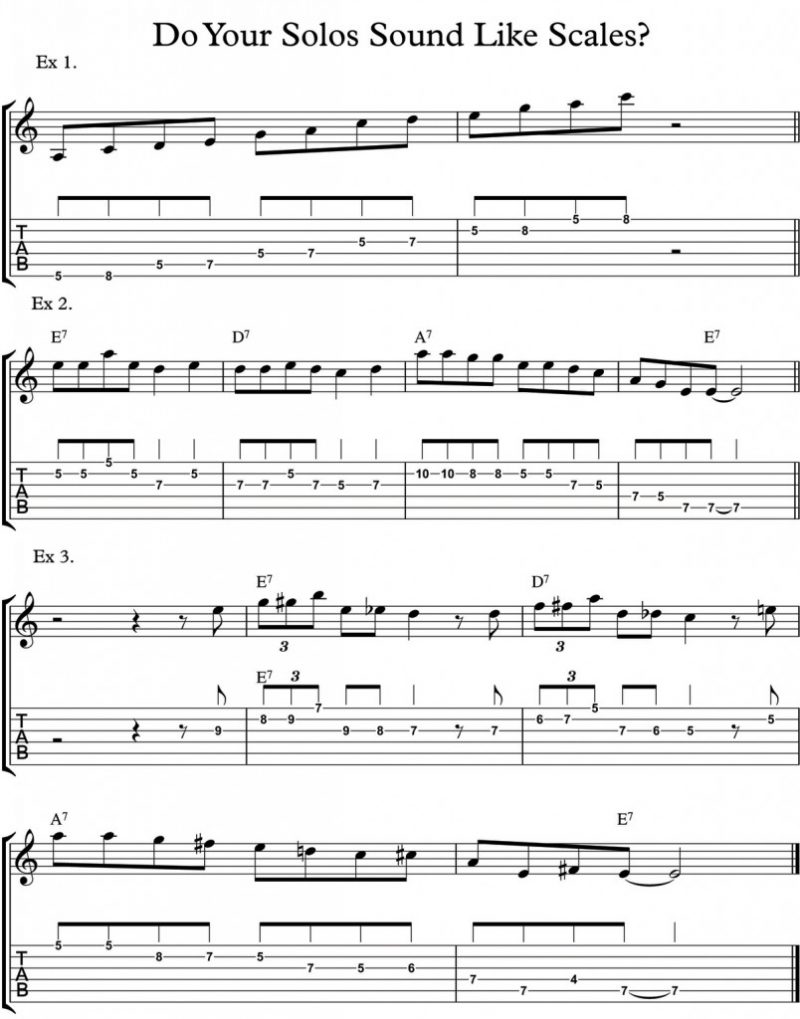Guitar Cool: Do Your Solos Sound Like Scales?
Guitar Cool: Do Your Solos Sound Like Scales?
A common grumble among guitar players is that their solos sound like they’re playing scales. Have you complained of this before? Read on, I have the cure.
Many new students say they thought they needed to practice scales as part of their daily routine, and were under the impression that scales are the life blood of soloing and improvising. They’re not completely wrong, but only partially correct.
You definitely need to know your scales as they form a large part of knowing your guitar neck, building technique, and getting confident playing all over the neck, etc. But you are what you practice. If you start to practice soloing using scales only, you are always going to sound like you are playing scales. You can solo while playing scales, but it is a lot more advanced to make it not sound like scales – and this is where many go wrong.
How the top players solo is by learning the language of the music they are playing – they don’t play scales as such. For example, if you’re a blues player you would learn some of the licks in the solos of your favourite blues artists. It is in the learning of the licks that you begin to develop the language of that particular genre of music.
Of course I am not just talking about soloing here, but there is another language of rhythm and back up guitar playing as well in all the different genres, which is a forgotten skill among many players.
Learning to play licks and solos is very similar to learning the English language. You learn a few phrases like, ‘Good morning Bill’ and ‘How is your day going?’ Then you put the two phrases together, and after a while develop your own speaking style. Solos are built the same way. By learning the licks of your favourite players you only have to know how to play the lick concerned and what chord it goes over. The beauty about this method is that you don’t have to know any complicated theory, although having a knowledge of theory does help you. So you can get started right away as it doesn’t matter what level you are at now.
If you listen to the solos of Jimi Hendrix you can hear him play the licks of Buddy Guy, and if you listen to Buddy Guy you can hear the licks of the players before him, and so on. It goes right back to Robert Johnson. It’s similar in every other genre, including classical music.
Exercise 1 shows the minor pentatonic scale at the fifth position, which is the scale of choice for many players in the key of A. Be aware that many players get stuck on this scale however.
Exercise 2 shows a scale sounding solo played over the last four bars of a blues progression. This is how many players sound when they say they sound ‘too scale-y’.
In Exercise 3 the lick is quite complicated theory-wise, but is relatively easy to play, and sounds professional. It definitely does not sound like you are playing scales. All you have to know is that it goes over the last four bars of a blues progression and you are in business. You can also see it is not difficult to play well, and you can hear the chords change.
Many argue that copying licks is not a good idea, that you will just sound like someone else. The truth is everyone from Bach and Beethoven, through to Clapton, Slash, Page, etc., have been copying each other for hundreds of years and it is not about to change. The trick is you have to make the licks your own by changing them slightly or putting a different feel on them.
So how do you learn the language of the music you want to play? You spend quality time learning the licks and riffs on your favourite recordings just like the all those legends before have done. If you have any trouble with learning licks it would pay to consult a great guitar teacher.
To hear a recording of the above examples go to http://www.guitar.co.nz/free-lessons/
Kevin Downing is a professional guitarist, teacher, and author. His contact details, along with many freebies, are on his website at www.guitar.co.nz

